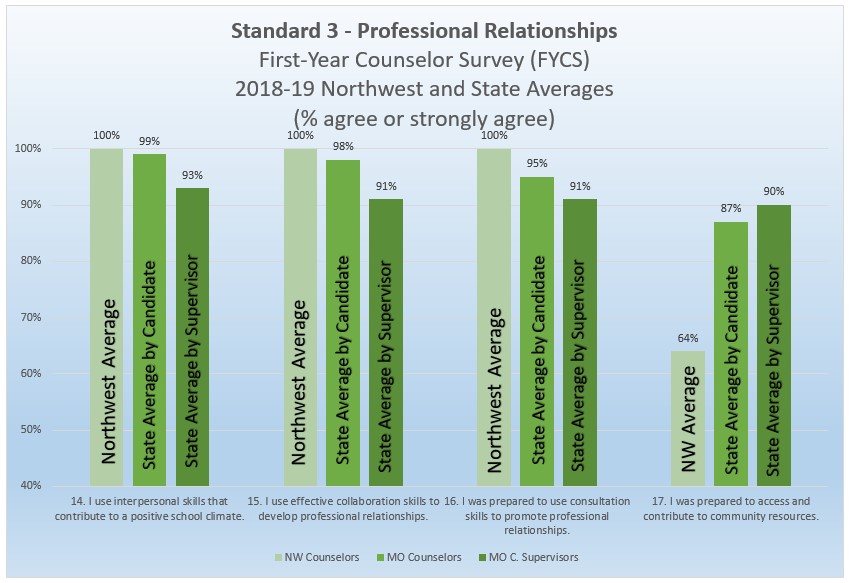All Northwest teacher, leader, and counselor candidates upon completion establish goals for their own professional growth and engage in self-assessment, goal setting, and reflection on their own practice. Further, all teacher, leader, and counselor candidates upon completion are able to collaborate with colleagues to support professional learning.
We have divided this portion of the QAR five sub-sections. The first addresses the university's institutional learning outcomes- Critical Thinking and Teamwork. The second addresses the suite of PLC courses that teacher candidates take beginning in their first trimester on campus that introduce and reinforce professionalism and professional collaboration, and the third addresses the Missouri Educator Evaluation System (MEES) artifact collection, which candidates complete during student teaching. The fourth analyzes data collected from the first-year teacher surveys administered by Missouri to analyze perceptions of our program completers' first year of employment, and the fifth and last addresses the university's advanced/graduate programs.
Throughout the university, coursework in both the PEU and also in general education, the College of Arts and Sciences and the Professional Schools emphasizes professional self-reflection and professional collaboration through two of the university’s seven institutional learning outcomes: Leadership and Teamwork. The Critical Thinking outcome states that all Northwest students will be able to “utilize information to generate reasonable hypotheses and draw educated conclusions, elucidate solutions based on these conclusions with the ability to self-evaluate their effectiveness,” and “recognize that this process is self-reflective and continuous.” The Teamwork outcome further emphasizes all Northwest students attain the capacity for “developing effective and ethical collaborative relationships.” Through these core university-wide outcomes, all Northwest graduates learn to reflect on their work through a self-reflective and continuous process and work effectively as a vital part of a team. To better understand how Northwest’s institutional outcomes align to the Missouri Educator Evaluation System (MEES), individual program-specific standards and outcomes, and AAQEP standards, please see Table 3: Northwest State and National Educator Preparation Standards Alignment.
In addition to coursework outside their PEU classes, all teacher candidates (except Music Education and Agricultural Education) in the newly redesigned undergraduate program are also introduced to professional self-evaluation, self-reflection, and goal setting, as well as collaborative professional learning through the suite of Professional Learning Community courses that they take beginning in their first trimester on campus. These fifteen-week, trimester-long, one-credit courses then continue throughout the program: PLC I in the first trimester, PLC II in the second trimester, and so on through to PLC VIII in their student teaching semester. The three phase-one PLC courses occur during candidates' first three trimesters on campus. During these courses, the program brings together candidates regardless of their grade level; future kindergarten teachers learn alongside future twelfth-grade teachers. The structure establishes a foundation in which candidates become members of a larger educational culture than just their own singular major or discipline; they learn to have the heart of an educator. Beginning in PLC IV, candidates divide between two tracks, as detailed in the flowchart below: one for elementary and special education candidates; and one for middle, secondary, and K-12 candidates. These later PLC courses reinforce candidates' skills in establishing personal professional goals and reflecting on their practice, and tie together content, skills, and dispositions taught in other Professional Education Unit-wide classes with an emphasis on collaborative professional learning.
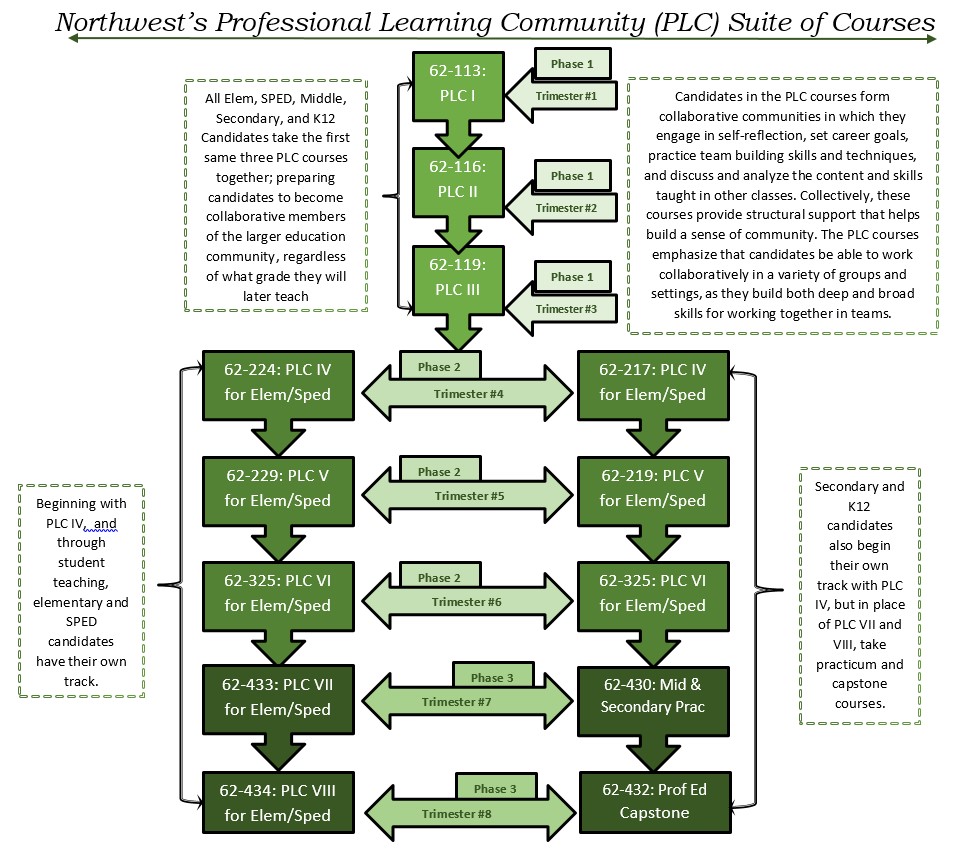
Candidates in the PLC courses form collaborative communities in which they engage in self-reflection, set career goals, practice team building skills and techniques, and discuss and analyze the content and skills taught in other classes. Northwest designed these courses to provide structural support that would build a sense of community amongst candidates. In contrast to a more traditional model, in which candidates would take three-credit education courses over fifteen weeks, Northwest's model of having candidates take three one-credit courses means that in any given trimester means that candidates interact with three different groups of colleagues and as many as three different instructors. This emphasizes that candidates must work collaboratively in a variety of groups and settings and that over the course of their entire program they meet and work with nearly all the other candidates who entered the program in the same year. This results in even stronger collaborative skills for teachers as they build both deep and broad skills for working together in teams.
Agricultural education teacher candidates do not take PLC I and II, but instead are introduced to professionalism and professional collaboration in 03-320: Foundations of Agricultural Education. Then, in addition to taking PLCs III, IV, V, and VI, concepts of professional collaboration and professionalism are reinforced throughout their program through 03-420 Program Planning in Agricultural Education, 03-421 Conducting Supervised Agricultural Experience Programs, 03-422 Community Programming in Agriculture, 03-524 Methods of Instruction and Assessment in Agricultural Education Laboratories, and 03-580 Methods of Instruction and Assessment in Agricultural Education. In addition to coursework, agricultural education teacher candidates also participate in a number of professional events: they attend the Fall Area Seminar, State Fall Adult Education Conference, Area/District Agricultural Education Teacher Meetings, National and State FFA Conventions, Fall and Spring Agriculture Career and Leadership Development Events, State Professional Development Summer Technical Institutes, and Preservice CASE curriculum certification training. At these events, professional collaboration also occurs as agricultural education teacher candidates have the opportunity to interact with current agricultural education teachers, state Department of Elementary and Secondary Education (DESE) staff, and professional development workshop facilitators. Agricultural education teacher candidates also join Collegiate FFA/ATA/PAS, in which professional dues to the National Association of Agricultural Educators (NAAE) are paid as student members. Agricultural education teacher candidates also join Missouri State Teachers Association (S-MSTA). Northwest’s Agricultural Education program narrative provides additional information specific to the program.
Syllabi for all PEU courses can be found in the Northwest AAQEP Canvas site.
Please note: Missouri Educator Evaluation System (MEES) is introduced in an earlier section of this report. If you have not already read that subsection, it is recommended that you go back to the previous section which details AAQEP Standard 1.1. This section will only address the MEES assessment as it applies to MEES Standard #3-5.
Teacher candidates in both the old and new programs apply professionalism and self-reflective practice as well as professional collaboration in their student teaching. Student teachers are assessed through Missouri Educator Evaluation System (MEES) Standards 8 (professionalism) and 9 (professional collaboration). Both of these MEES standards (as well as the other seven) have all been cross-walked throughout all of the university’s education programs, as outlined in Table 3: Northwest State and National Educator Preparation Standards Alignment.
Because assessment and data literacy, professionalism, and professional collaboration are difficult for a university supervisor to assess through observation, Northwest faculty began collecting artifacts in 2018 to measure teacher candidate performance on MEES Standard #7 (assessment artifact), MEES Standard #8 (professionalism artifact), and MEES Standard #9 (professional collaboration artifact). These three artifacts then provide university supervisors insight into candidates’ skills in assessment, their professionalism, and their professional collaboration during their student teaching. (Please note that information about how Northwest uses Standard 7 data in its continuous improvement is addressed earlier in this report in the section detailing AAQEP Standard 1.4) Northwest closely monitors the collection of these artifacts and seeks candidate, faculty, staff, and school partner feedback as it strives to continuously improve our artifact collection in support of quality assurance. This new process will likely continue to improve in the coming years, but it is an innovative approach to measuring MEES 7, 8, and 9, and Northwest takes great pride in the collective assessment and analysis work thus far in the artifact collection.
As shown in the data below, Northwest candidates’ performance on MEES Standards #8 and 9, which address professionalism and collaboration, compares favorably with the state average for 2018-19.
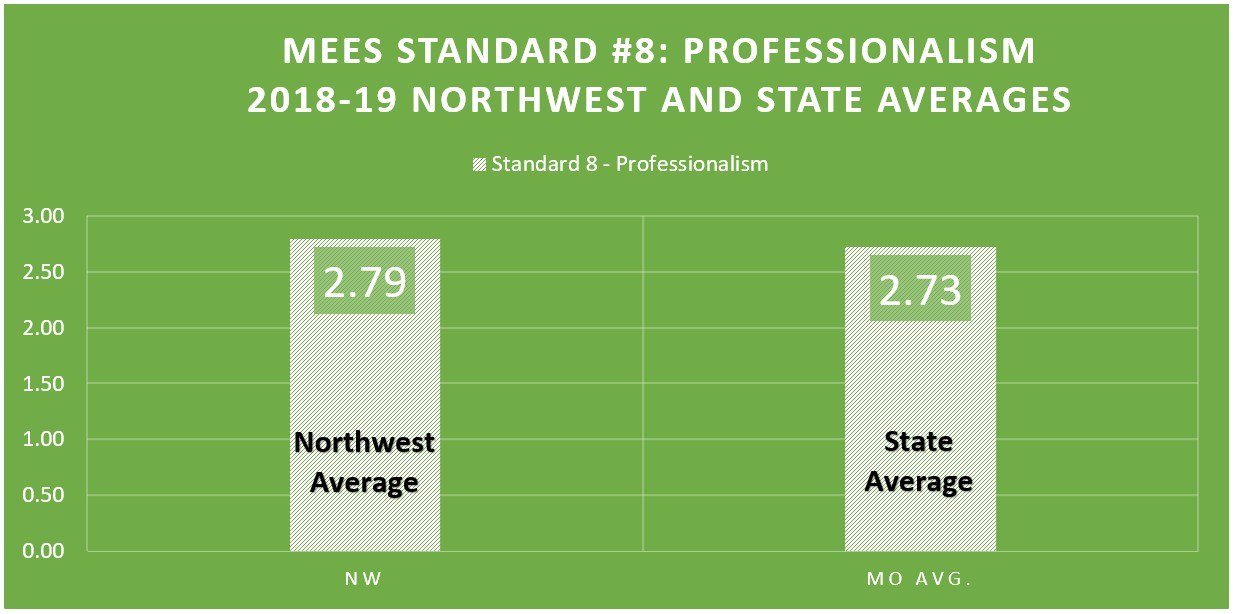
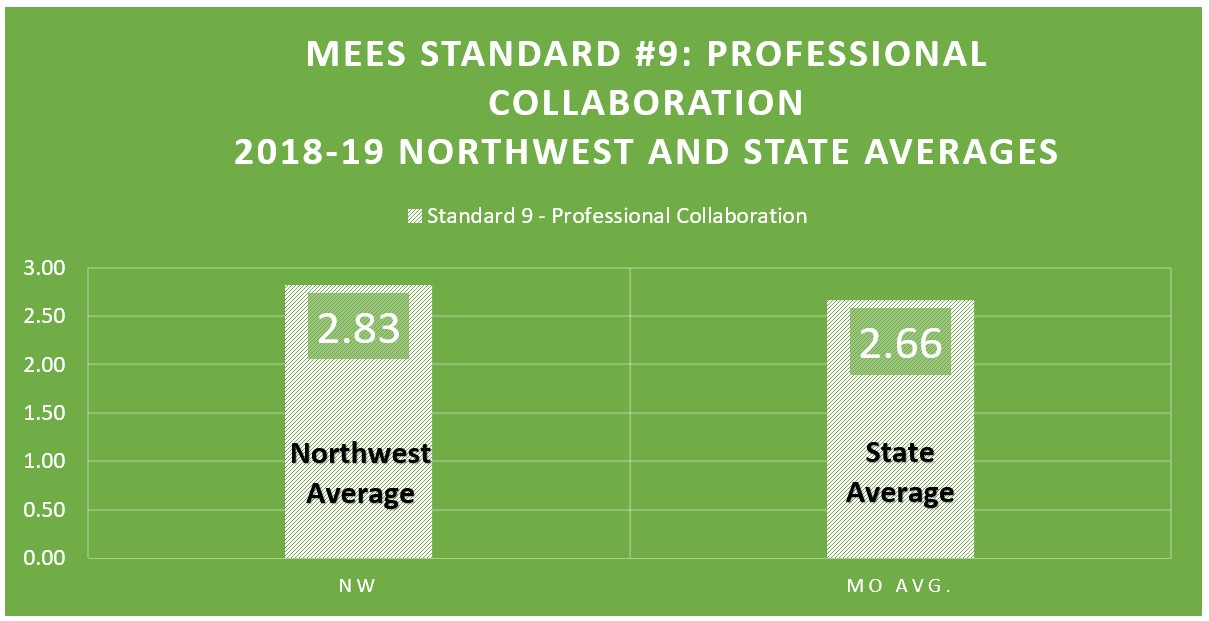
The Missouri Department of Secondary and Elementary Education (DESE) has a suite of six surveys educators complete in their first year of employment, which DESE has been collecting since the 2015-16 academic year. The First-Year Teacher Survey (FYTS), taken by the teacher, in alignment with MEES Standard #8, asks completers two questions after their first year of teaching to assess their preparation in "analyze[ing] data to reflect on areas for professional growth" (FYTS question #35) and in "reflect[ing] on their practices for professional growth" (FYTS question #36). In addition, the First-Year Teacher Survey by principals (FYTS), taken by principal, assesses Northwest teachers following their first year on the job complete, likewise has two similar questions regarding professionalism (questions 34 and 35). In the first of these, as shown in the table below, 81% of completers in their first year and 77% of their principals "agreed" or "strongly agreed" that in their first year they were "prepared to analyze data to reflect on areas for professional growth." In both cases, Northwest-prepared candidates perceived themselves and were also perceived by their administrators to be comparatively better prepared than first-year teachers at peer institutions. Similarly, Northwest also exceeds the state average in direct measures regarding completers' preparation "to reflect on [their] practices professional growth."
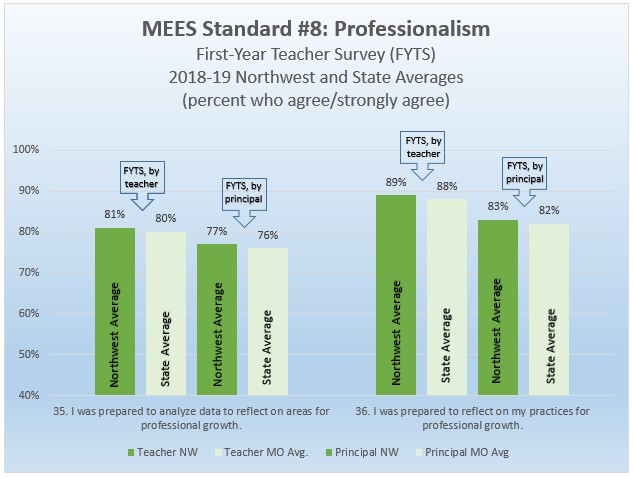
Further, in alignment with MEES Standard #9, the FYTS surveys ask completers in their first year and their principals three questions to assess completers' preparation in professional collaboration: regarding completers' preparation in "collaborate[ing] with colleagues," regarding completers' preparation in "collaborate[ing] with parents," and regarding completers' preparation in "participant[ing] in professional organizations." On these questions, as shown in the chart below, Northwest matches or exceeds the state average on eleven of the twelve responses. These data suggest that Northwest teachers are well-equipped in their first year to reflect on their own professional growth and engage in self-assessment, goal setting, and reflection. The data suggests, as well, that completers are able to collaborate successfully with colleagues and parents to support learning.
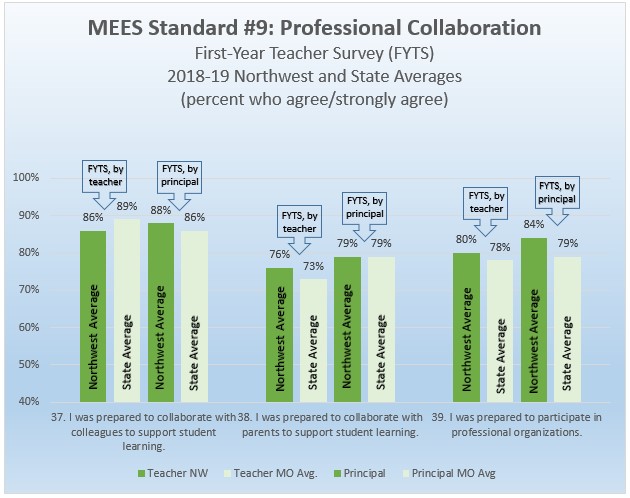
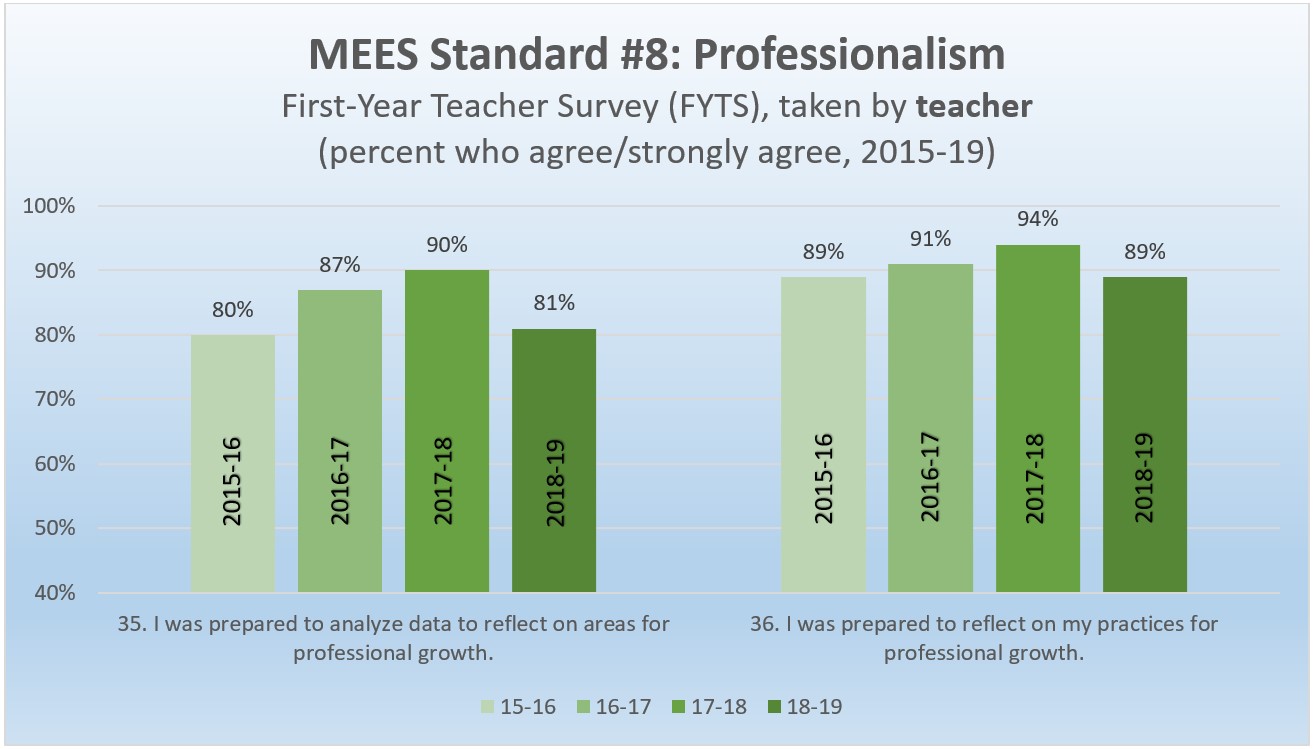
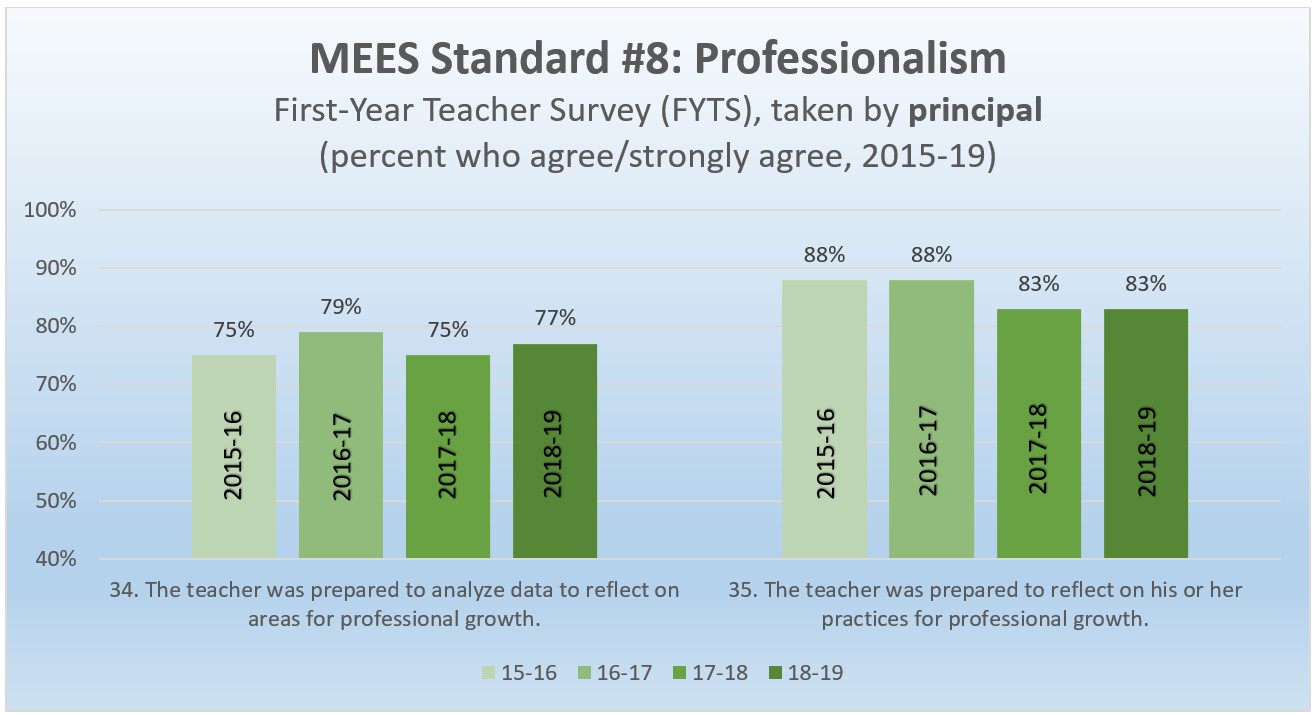
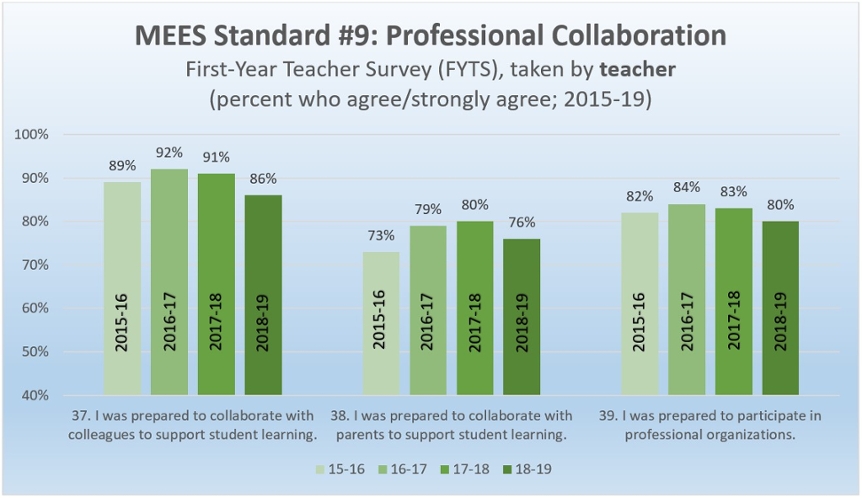
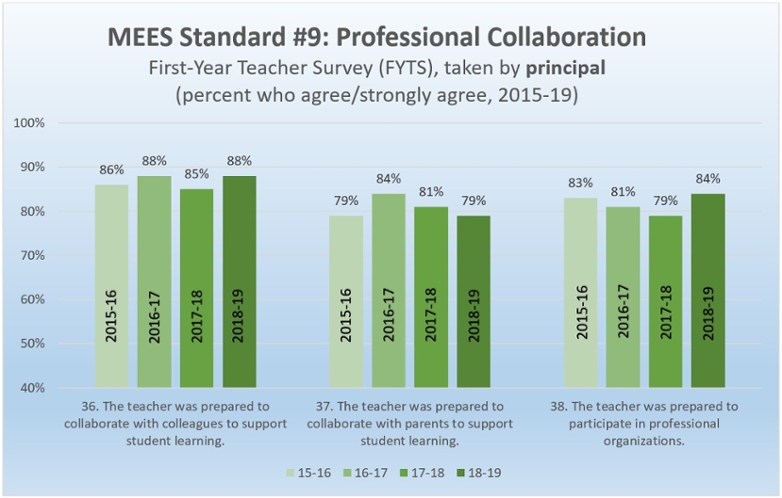
FYTS data regarding MEES 1-7 are included in earlier sections in this report. The graphs above reveal evidence in support of the program’s impact on candidate skill development in two key areas: collaboration and professionalism.
Missouri’s Department of Secondary and Elementary Education (DESE) administer first-year principal and counselor surveys to completers and their direct supervisor at the end of completers’ first year of employment. The First-Year Principal Survey (FYPS) asks candidates and their direct supervisor two questions related to professional development. On both of these, Northwest principal completers perceive themselves favorably regarding their preparation “to use research and best practice to guide his or her professional growth” and “to use research and best practice to guide professional growth for personnel.” Below, we present strong evidence of effectively-prepared school leaders.
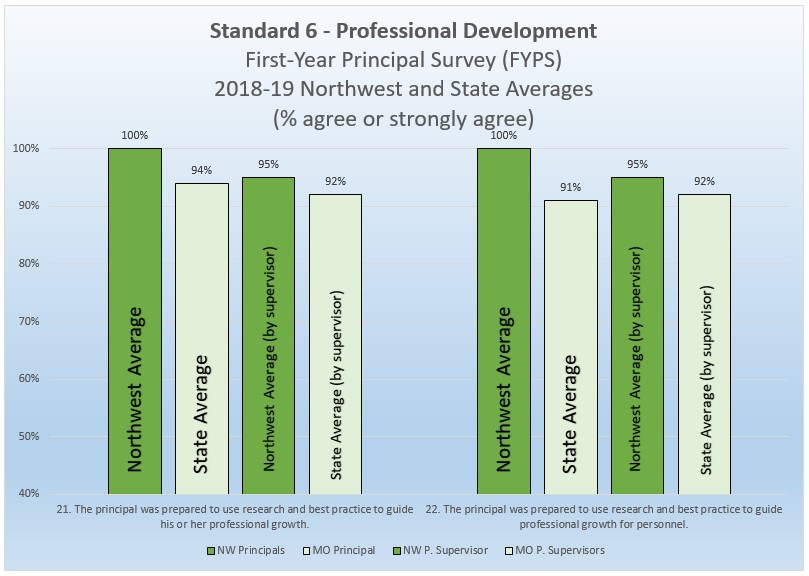
The First-Year Counselor Survey (FYCS) asks candidates and their supervisors four questions related to professionalism and professional relationships. Note that DESE did not provide Northwest with supervisor responses because the sample size was insufficient. On these, Northwest counselor completers perceive themselves favorably regarding their “interpersonal skills,” “effective collaboration skills,” and “consultation skills” as shown in the chart below. However, they do not perceive themselves favorably compared to their state peers in their “preparation to access and contribute to community resources.” This thus now has been taken under consideration by faculty administering the Counseling MSED as they continue to revise and improve their program. We will continue to seek more data and viewpoints of program effectiveness to better understand the impact of our preparation for new counselors. Based the data below, we recognize areas of relative strength, and also the opportunity to probe, and improve upon our counselor-graduates’ ability to contribute to and access community resources.
